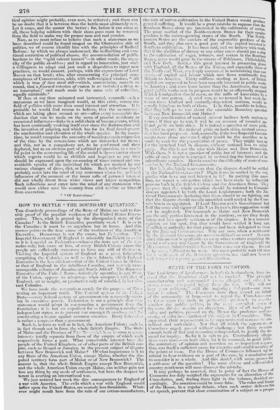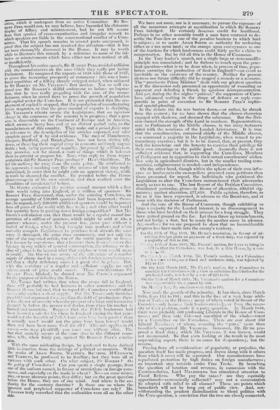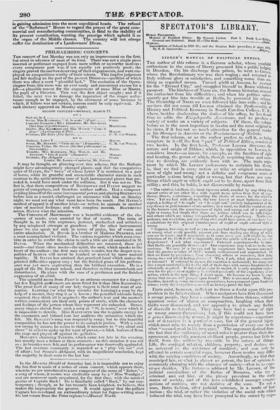STATE OF TUE CORN QuEsnoN.
Tut: Legislatuse of Landowners, in ly.sth thcir chambers, have do-
ereca that 171,2 Ilsead-tax shall m.t 10,‘ loached. The principal mannraettning and vommerend tosstts alleged, and ofiss,s1 to
eAss cs.pecia1 froat the tux. "We will not evidcace," said the majority ; " depart—our reso-
lia:,,u tolscu.'"fIss C,,siisous were then moved on behalf the community at large—m4 to repeal the Corn-low—not whetlwr pu1l1;; we'''e, in the :nese; ce:tended senze of the tcrin. did n<,!. rts!;Liro t,inituralion. 31(.11 of all ranks, pur-
suits. and politics, pres.sed on tha lease the prudence and ne- eessity of calm inv.--.1.,sation of this sui;ject in Committe:.‘. They supported their rqrcseu:sit U us hi' arguments and statems '.ts un- refined and undenitshis. Not that all which the opponents of
Corn-laws urged, pa 1.without challenge ; but there remains enough both of fact and rcssoning unimpeached, to justify the de- mand far inquiry. So far it is f;;It.0 to go. Contradictory allega- tions were made—on both sides, let it be assumed, in good faith: the contrariety of opinion and assertion On Si) important a ques- tion, was itself a sufficient cause for attentive and candid scrutiny of the points at issue. But the House of Cumulous followed up its refusal to hear evidence on a part of the case, by a resolution not to consider it as a whole. And this deniel, with some, passes for a settlement of the question ! The most obtuse and self-satishcd country gentleman will soon discover the mistake. It may perhaps be asserted, that in point of fact the Douse of Commons has duly weighed the arguments for an alteration of the Corn-duties, and, finding them light in the balance, decided ac- cordingly. No assertion could be more false. The rules and fornr of the House, in a regular debate, when each orator delivers his set speech, prevent that close examination of a subject or a propo-
.sition, which it undergoes froni an active Committee, Sir Ito- famT Prim would not, we may believe, have hazarded his elaborate displaY of fallacy and misstatement, had he not felt secure from that species of cross-exarnination and irregular remark to which speakers are liable in the conversational conflict of a Com- mittee. That his speech remains in several parts unexposed, is proof that the subject has not received due attention—that it has
tot been thoroughly discussed in the House. It may be worth 1while to illustrate this remark by a reference to some of the flit-
ladies Or misstatements which have either not been noticed at all, • or insufficiently. Throughout his entire speech, Sir ROBERT Pm, avoided collision
with the manufzicturers on the case Nvhich they really put betbre
Parliament. He compared the exports of 1838 with those of 1837, to prove the increasing prosperity of commerce : this was a bare-
faced repetition of a fallacy already stripped naked, when adduced bv Sir ROBERT on Mr. Vimarats's first motion. Not so well ex- posed was Sir ROBERT'S skilful endeavour to induce an impres-
sion, that he was really grappling with the case of the maim- fheturers, when he stated facts to prove the growth of population and capital under the Corn-law. it is not pretended that the em- ployment of capital is stopped, that the population of manufacturing tmvns stagnates, or that the gross amount of exports is declining.
Mr. VILLIERS'S clients assure the Legislature, that an it/dee/cats
ehmeee in the commerce of the country is in progress; that a pro- cess is discernible on the Continent of Europe and in America, which menaces heavy loss, and at no distant period ruin, to the manufiteturers of this country. They make out a ivinte fiwie case bv reference to the description of the articles exported, and offer complete proof of it by oral evidence. The men of Manchester, Glasgow, Sheffield, and Birmingham, have not been sitting idly down, or throwing their capital away in concerns unitbrntly unpro- fitable ; but, belng persons of sagacity, sharpened by self-interest, they perceive, not far ahead, a state of things which it behoves them to prevent or prepare fbr. Now, what reply to these repre- sentations did Sir Rom: ter Pienr, produce ? He avoided them. fie led his auditory fin. away faom the ;ludo point. 1 le attributed to his opponents something very like the reverse of what they really maintained, in order that he might vain int apparent victory, while in truth he shunned the conflict. lie paraded before the I louse phantasmagoria of' his own creati:m, and then exulted over the demolition of unsubstantiel beings.
Mr. Gram: estimated the average annual amount which a free trade would bring into England, at a million of quarters Sir Roomer Pion, discovered, that, under the existing Corn-laws, an average quantity of 750,000 quarters had been imported ; there-
fore, he argued, only 250,000 additioral quarters would be imported from ell parts of the werld with free treat: ; and what effect would that quantity have in putting down foreign competition? But Mr. Giurra's calculation was, that there would be a regular annuul im- portation of a million of quarters, which might be sold at 45s. a quarter: whereaa, under the present law, years pasa without a
bushel of tbreiga wheat being baotOt into market ; and when necessity compels Englishmen to purchase load abroad, the cur-
rency is deranged, the price rises enormously, and not only Cie price of the imported article, but of the entire quautity at honir:. It is known by experience, that whenever there is on en-,:c:,,s or ex- fickney in any article of general constmipticiii, themivanco or ac- C11110. Of HMS lA fire beyond what that sItrphts or want would scent to justify. Mr. Grto-rE was aware of the adv;A-age of a rqvdur supply of cheap food in a competitir.:: v'ith Ibreign iuonmilkctuvers.: awl that a slight deficiency caused. a great rise in pekes. But. vit.) the certainty of a regular and ,talcient supply, no such (aleme,:mcnt of price could occur. 'Mesa considerations Sir Pm. blinked : he slurred over Mr. CROTI:s argument for tie. purpose of' deludieg the llouse.
Mr. Toot: e had written, that when the enrpa litil io England. there will probably be bad harvests in her countrica : mid Sir
Rom— I 11121tee inlinTed. that to repeal the Corn-laws would aflbrd no s;..nrity n.gain.-4 a short srpply. bit )11% 'room.: only furnishes argument for conending the field of production: there is lessch mice or scarcity when the prospect of a large and increasing- demand is before the grower aml denier, than when ids market is limited end uncertain. Suppose that the Polish landowner had been insured a sale for 1:is elleat in Eealend during the last year :
would net the breadth of laud soe•e lames: been greeter than It actuelly was ? would not the price hive been lewer wrath' there I t have been more food for all ? rule oHlies in oil seteeee —to reap plentifully von mm sow wit hoot atint. The fitct dint scarcity occurs at the aente time in the different coun- tries, tells, when fitirly put, agailot Sir Romer PErt.'s conclu- sion.
'With the same misleading design, he professed to have derived little instruction from the writings of political economists. With the works of ADAM SMITH, :MALTHUS, RICARDO, "APCULLOCH,
and ToRREN,, he professed to be finniliar ; but they were all at variance with each other. On what subject, Sir Ronmer ? Olt
the policy of Corn-/azes? Can you quote a single passage, from We have not room, nor is it necessary, to pursue the exposure of all the numerous attempts at mystification in which Sir ROBERT PEEL indulged. He certainly deserves credit for hardihood. Perhaps in no other assembly would a man have ventured to de- scribe the Poor-law as one of the peculiar burdens to which land is subject ; or to quote AnAm SMITH as authority for reckoning tithes as a tax upon land; or the stamps upon conveyances as one of the burdens for which landowners could fairly pmfcr a claim to compensation. But he did all this in the House of Commons.
In the Tory leader's speech, not a single large or statesmanlike principle was enunciated; and he forbore to touch upon the prac- tical question—what is to be done when, in process of time, popu- lation outstrips the production of food in England?—an event as inevitable as the existence of the country. Neither for present distress nor future difficulty did he suggest a remedy or a resource. The " proximate Prime Minister" dealt with our greatest question as if the discussion only presented an opportunity of wounding an opponent and deluding a friend, by specious misrepresentation. And yet, during the five nights "palaver," the supporters of Corn- laws advanced nothing in the shape of defence or reply com- parable in point of execution to Sir ROBERT PEEL'S sophis- tical special-pleading.
In the debate the foe was beaten down,—or rather, he shrank from the contest ; for we have shown that the chosen champion engaged with shadows, and shunned the substance. But the divi- sion showed the strength of the Land in numbers. Representatives, sent to Parliament by the Middle classes, in too many instances sided with the nominees of the Landed Aristocracy. It is true that the constituencies, composed chiefly of the Middle classes, con connuand a majority in the Legislature, when roused to ex- traordinary exertion ; but it is to be feared, that, at present, they lack the knowledge and the honesty to exercise their privilege for their own advantage or the public good. Assuredly there is not sufficient evidence that, in supporting the Corn-laws, Members of Perliament act in opposition to their actual constituents' wishes. Not only in agricultural districts, but in the smaller trading com- munities, enlightenment is needed—and independence.
On the other hand, though within the sphere of their own influ- ence as landowners the monopolists procured more petitions than those presented for repeal, the individuals who petitioned the Legislature to alter the Corn-laws outnumbered their adversaries nearly as two to one. The last Report of the Petition Committee, distributed yesterday, gives—in favour of alteration, 490,648 sig- natures; against alteration, 277,818. Public opinion, therefore, as fitr as it. has been expressed, is adverse to the Bread-tax, and at issue with the decision of Parliament.
And the vote of the House of Commons, though exhibiting so large a majority for the Landed interest, is no discouragement to those who have buckled on their armour for a long struggle. They have gained ground on the foe. Let them throw up intrenehments, and not budge a foot, but be ready for another move in advance. Ay, «noMer; fbr we are prepared to show that no inconsiderable progress has been made into the enemy's territory.
On the 17th of May 1833, Mr. Ilt:mn's resolution, in favour of ad- mitting fonjga grain on payment of a fixed duty, was rejected by a majority of :ma to 10e.
Ce the 18;1) of June 18:M' Mr. FRYER'S motion, for leave to bring in to alter the Corn-laws, was lost, in a thin House, by a vot.?
On („11 :.Tarelt 1834, Mr. Humes motion, for a Coimuittee
w;:it ‘,.14vs- Ia imi;o6e a fixesi and moderate duty, is-as rejected by 312 to On the 1Gth March 1837, Mr. CLAY'S motion, for a Committee to consi,lea the Urn-laws with a view to substitute fixed duties for the graduat settle, NV:1S lest by a yote of 223 to 89.
On the 1.:-■di of March 1828, Mr. Vmramts's motion for a Committee was suiirtenl by 95. clposed by :100.
Men,.:y last, the numbers were 342 to 195.
Now uteri, the growth of the minority. It has risen, since March 1834, from 155 to 195 : and this in the thee of a very large addi- tion orforics in the House ; many of whom voted in favour of the Corn-lae a only because their leaders unwisely, or front the neces-
sity of their position, made it a party question. ln March 1634, there were probably 300 professing Liberals in the House of Com- mons : and then only 135—not one-third of' the whole—voted ibr a Cowin:flee on the Corn-laws. There are now about 330 Liberal Membera ; of' whom, counting the " pairs," more than Ovo-thirds supported Mr. Vimmots. Moreover, Mr. Heat E pro- posed a fixed duty; which Mr. Vimatats, it was known, would not recommend. So that even looking at the result in its most unprotniaing aspect, there is no cause for despondency, but the reverse.
Passing from all considerations of popularity or prejudice, the question itself has made progress, and drawn along with it others from which it never will be separated. Our manufacturers have repudiated protection by high duties on foreign manufactures ; au important step towards entire Free Trade. By broaching the question of taxation and revenue, in connexion with the Customs-duties, Lord :MELBOURNE has stimulated attention to
Fiscal Reform. Who pay the taxes ? are they equitably apportioned—economically collected? may not a commutation be adopted with relief to all classes ? These are points which henceforth will not be long out of public view. And, not- withstanding the prudent disinclination to blend politics with the Corn question, a conviction that the two are closely connected,
is gaining admission into the most unpolitical heads. The refusal of the "Reformed" House to regard the prayer of the great com- mercial and manufacturing communities, is fatal to the stability of its present constitution, wanting the prestige ivhich upheld it as the organ of the Middle classes. The country will not always suffer the domination of a Landowners' Divan.




























 Previous page
Previous page